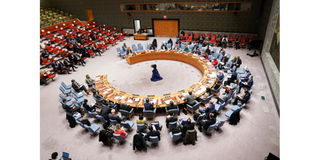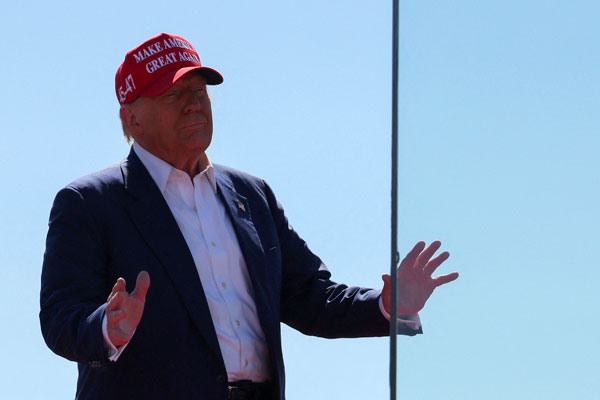Why Africa should rethink the quest for UNSC permanent membership

United Nations Security Council in session. PHOTO | AGENCIES
What you need to know:
- At first glance the prospect of African nations holding permanent seats on the UNSC appears to be a step toward rectifying historical injustices however, It could very well be a trap that can open wide the continent’s deep-seated fault lines
The proposal to allocate two permanent seats on the United Nations Security Council (UNSC) to Africa, backed by the United States particularly, may seem like a long-overdue acknowledgement of the continent's significance, but a deeper analysis reveals that this offer might be a double-edged sword, a carefully crafted trap designed more to serve the interests of global powers than those of Africa itself.
Illusion of power or divisive offer?
African nations have long aspired to secure permanent representation on the UNSC, with many leaders salivating at the opportunity to wield veto power within this influential body.
This ambition was notably articulated during the African Union’s fifth ordinary session in Sirte, Libya, in 2005, where African leaders adopted the Ezulwini Consensus.
This agreement underscored Africa's commitment to achieving full representation in all decision-making organs of the UN, particularly the Security Council.
Advocates for this vision have put forth numerous compelling arguments supporting the case for Africa to be granted permanent seats on the UNSC, as well as additional non-permanent seats, emphasising the continent's rightful place in global governance.
At first glance, the prospect of African nations holding permanent seats on the UNSC appears to be a step toward rectifying historical injustices and ensuring that Africa has a more prominent voice in international affairs.
However, this seemingly generous offer could very well be a trap that could open wide the continent’s deep-seated fault lines.
The process of selecting the two countries or regional bodies to occupy these coveted seats is bound to be fraught with intense competition and political manoeuvring.
Global powers, especially the US, China, and Russia, are likely to exploit these divisions to their advantage, playing one African nation or bloc against another on the one hand and intensifying their ‘cold wars’ on the other, all these at the expense of Africa.
Africa’s infighting could exacerbate existing tensions between African nations and create new fissures within the continent.
Countries with differing political ideologies, economic interests, and regional alliances might find themselves in a fierce contest for these positions, risking the fragile unity that Africa has painstakingly built over decades.
The African Union (AU), which has long advocated for continental integration and solidarity, could be left struggling to maintain its cohesion in the face of external pressures and internal rivalries.
Ultimately, this scenario could weaken Africa’s ability to present a unified stance on critical issues, undermining its influence on the global stage rather than enhancing it.
Undermining Pan-African integration efforts
One of the most significant threats posed by the proposed UNSC permanent seats is the potential derailment of pan-African integration efforts that have been steadily gaining momentum in recent years.
The allure of such a powerful position could divert the attention and resources of African leaders away from regional cooperation and toward the pursuit of individual interests.
This shift in focus could stall important initiatives such as the African Continental Free Trade Area (AfCFTA), which aims to create a single market for goods and services across the continent.
AfCFTA requires the goodwill of African leaders, which might be spoilt by the possible infighting.
Furthermore, the internal power struggles that would accompany the selection process for these permanent seats could weaken the continent's ability to speak with a unified voice on global issues.
Africa has, in recent years, managed to build consensus on various matters of international importance, such as climate change, debt relief, and sustainable development.
The scramble for permanent seats, however, could undermine this progress, leading to a fragmented continent with weakened bargaining power.
A relic of imperialism and inequity
To fully understand why the offer of permanent UNSC seats is a trap, it is essential to examine the structure and function of the UNSC itself.
The UNSC is a relic of the post-World War II era, designed to reflect the geopolitical realities of that time.
The five permanent members (the United States, the United Kingdom, Russia, China, and France) wield disproportionate power, with the ability to veto any substantive resolution.
This arrangement reinforces a mentality of "might makes right," enabling these nations to police the world through military intervention, sanctions, and other coercive measures.
For decades, the UNSC has been criticised for its inability to adapt to the changing dynamics of the international community.
Developing nations, including those in Africa, have often found themselves on the receiving end of decisions made by a select few powers that have little regard for their interests or concerns.
By accepting permanent seats on this fundamentally flawed institution, Africa would be legitimising a system that perpetuates inequality and undermines the principles of fairness and justice that the United Nations claims to uphold.
UNSC Interventions in Africa is a troubling track record
Africa’s history with UNSC-sanctioned interventions provides a cautionary tale of the potential dangers of granting the continent permanent seats.
Numerous African countries have experienced the devastating consequences of UNSC-mandated actions that have led to instability, human rights abuses, and economic hardship.
In countries such as Libya, the Central African Republic, and Sudan, interventions have often resulted in prolonged conflict, exacerbating humanitarian crises rather than resolving them.
The Libyan crisis, in particular, serves as a stark reminder of how UNSC interventions can spiral out of control.
The 2011 NATO-led intervention, sanctioned by the UNSC, resulted in the overthrow of Muammar Gaddafi but left the country in a state of chaos and lawlessness.
The power vacuum that ensued has allowed extremist groups to gain a foothold, destabilising not only Libya but the wider Sahel region.
Such outcomes demonstrate that the UNSC's actions, even when ostensibly aimed at protecting civilians or restoring peace, can have long-lasting and detrimental effects on African nations.
Africa should call for reform, not reinforcement
Rather than clamouring for seats on the UNSC, African nations should focus on advocating for the complete overhaul of this outdated and ineffective institution.
The UNSC’s current structure is ill-suited to address the complexities of the modern world, where power is increasingly diffused and challenges are more interconnected than ever before.
In an era of globalisation and interdependence, the concept of a few select nations wielding absolute power over the rest of the world is both anachronistic and dangerous.
A reformed global governance system should be one that truly reflects the diversity and multiplicity of voices within the international community.
The UN General Assembly, which comprises all 193 member states, offers a more democratic and transparent forum for addressing global issues.
It is here that Africa, as a continent with 54 member states, can exercise greater influence and push for policies that align with its interests and values.
The false promise of veto power
One of the most alluring aspects of the proposal to grant Africa permanent seats on the UNSC is the accompanying veto power.
However, this power is a double-edged sword.
While it might seem like a valuable tool to protect African interests, the reality is that the veto has often been used by existing permanent members to block resolutions that could advance peace, security, and human rights.
Moreover, the exercise of veto power by African countries could invite retaliation or diplomatic isolation from other global powers, further entrenching the continent's marginalisation.
Additionally, possessing veto power could place Africa in the uncomfortable position of having to take sides in disputes between major powers.
This could compromise the continent's ability to maintain its policy of non-alignment and neutrality, which has been a cornerstone of its approach to international relations.
Rather than empowering Africa, the veto could become a weapon that others wield to manipulate and coerce African nations into serving their agendas.
For Africa to truly thrive on the world stage, it must advocate for a system of global governance that is rooted in inclusivity, equity, and justice.
This means pushing for reforms that democratise decision-making processes within the UN, ensuring that all countries, regardless of their size or economic strength, have an equal voice in shaping the future of our planet.
Rather than aspiring to join an exclusive club that perpetuates inequality, Africa should champion a vision of international cooperation that reflects the principles of solidarity, mutual respect, and shared responsibility.
The African Union, as the primary representative of the continent, must take the lead in articulating this vision.
By working with other developing regions such as Latin America, the Caribbean, and Southeast Asia, Africa can build a coalition of nations committed to transforming the UN into a truly representative and accountable institution.
Lessons from Africa’s history
Africa’s history is replete with examples of how external powers have exploited the continent’s resources, divisions, and vulnerabilities for their gain.
From the colonial era to the Cold War, and even in today’s geopolitically charged climate, Africa has often been the battleground for competing interests.
The proposal to grant permanent UNSC seats must be seen by every African as yet another attempt by global powers to insert themselves into African affairs under the guise of offering influence.
By rejecting this offer, Africa can send a powerful message that it will no longer be a pawn in the strategic games of others.
Ultimately, the rejection of the UNSC permanent seats should be seen not as a retreat from international engagement but as a bold step towards reimagining the way the world conducts its affairs.
A new paradigm of global governance must be built on the foundations of equality, fairness, and collective decision-making.
Africa, with its rich history, diverse cultures, and vibrant economies, has a unique opportunity to lead this transformation.
The continent should invest in strengthening its regional institutions, enhancing intra-African cooperation, and building partnerships that are based on mutual benefit rather than dependency.
By doing so, Africa can assert its role as a key player in shaping a more just, equitable, and sustainable global order.
Embracing a future beyond the UNSC
The offer of permanent seats on the UNSC is a seductive but ultimately perilous proposition for Africa.
It promises influence but delivers division; it entices with power but ensnares in dependency.
By rejecting this trap, Africa can chart a course towards genuine empowerment, advocating for a reformed UN that represents the aspirations of all humanity.
The path ahead is challenging, but Africa's resilience, wisdom, and vision for a better world make it more than capable of leading the way toward a brighter future for all.




